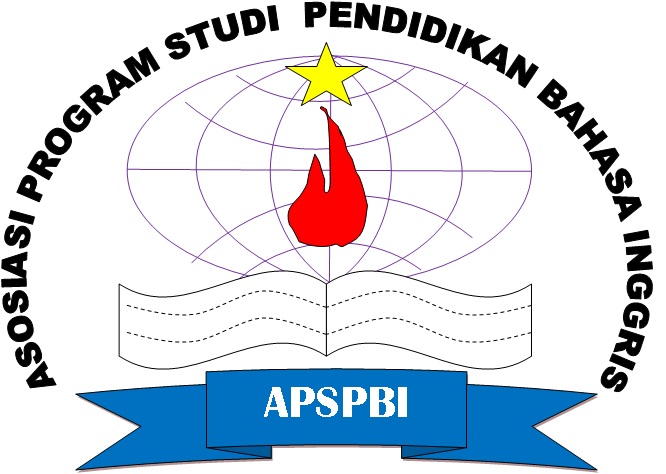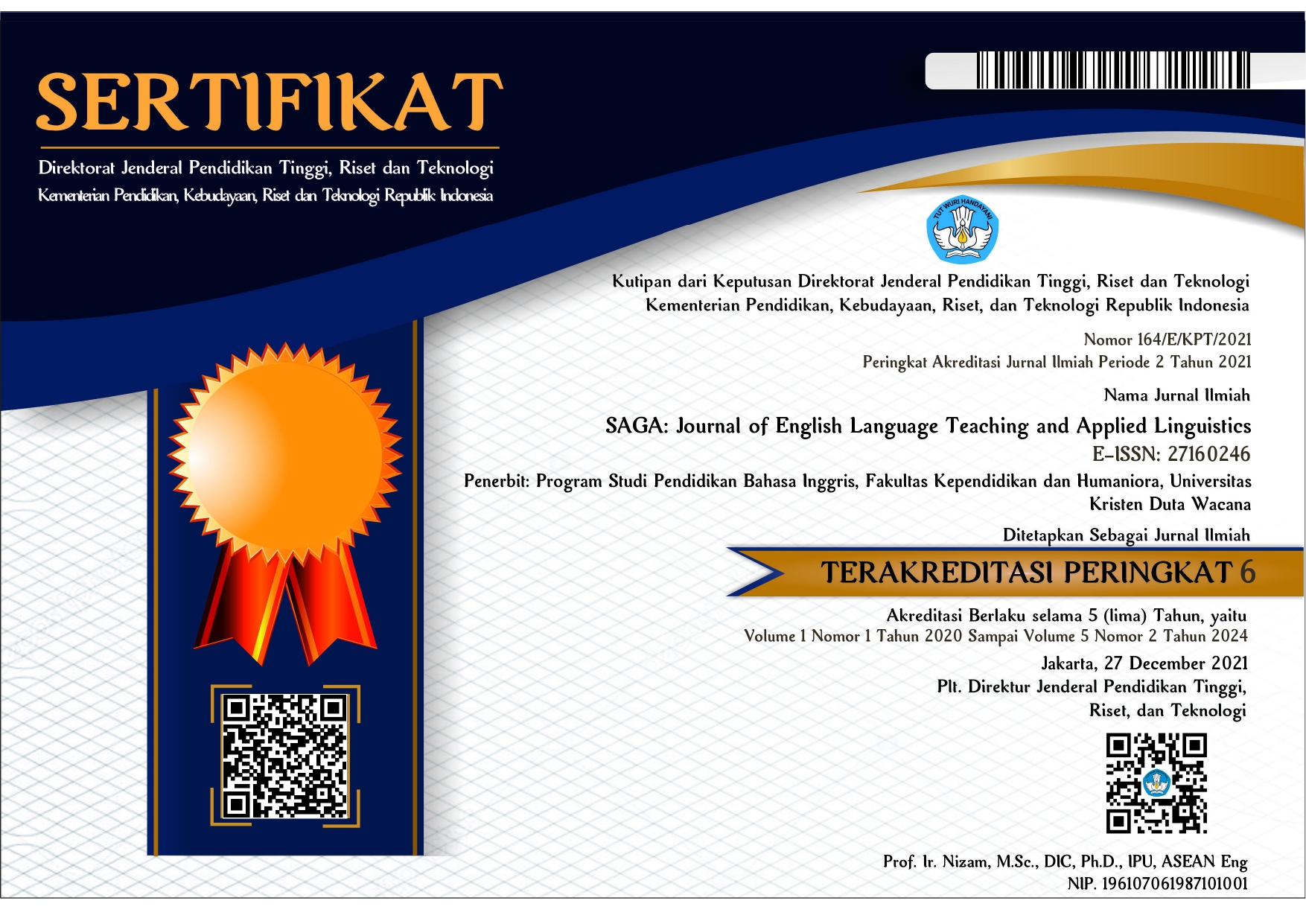English Education Master Students’ Perceptions on Developing Critical Thinking Skills in Academic Writing
DOI:
https://doi.org/10.21460/saga.2022.32.116Keywords:
Critical Thinking Skills, Academic Writing, English Education Master StudentsAbstract
One of the essential factors strongly supported university EFL learners’ academic writing skills development is critical thinking. With the supports of critical thinking skills, university EFL learners will be capable of synthesizing, analyze, and evaluate their ideas to be written effectively in their academic writing products. This present small-scale qualitative study was conducted with the support of qualitative content analysis to obtain clearer data based on the specific phenomenon told by the research participants. 10 items of the Likert-scale questionnaire as well as 5 open-ended written narrative inquiry questions were administered to 16 English Education Master Students batch 2019, Sanata Dharma University, Yogyakarta. Based on the obtained research results, the utilization of critical thinking skills progressively enabled graduate university EFL learners to be more strategic, analytical, and proficient academic writers. In addition, the participants also acknowledged that critical thinking skills should be practiced intensively in a long-lengthy process to foster their academic writing skills as well. It is expectantly hoped that these obtained results will shed more enlightenment on the further utilization of critical thinking skills for the betterment of academic writing learning activities in the future.
Keywords: Critical Thinking Skills, Academic Writing, English Education Master Students
References
Abbasi, A., & Izadpanah, D. S. (2018). The relationship between critical thinking, its subscales and academic achievement of English language course: The predictability of educational success based on critical thinking. Academy Journal of Educational Sciences. https://doi.org/10.31805/acjes.445545
Al-Dumairi, E., & Al-Jabari, N. A. (2016). Arab EFL students' application and awareness of critical thinking in college writing: A case study. Arab World English Journal (AWEJ), 6(4). 419-431. https://www.awej.org/images/AllIssues/Volume6/Volume6number4Decmber/32.pdf
Ariyanti, A. (2016). Shaping students’ writing skills: The study of fundamental aspects in mastering academic writing. Indonesian Journal of EFL and Linguistics, 1(1), 63–77. https://doi.org/10.21462/ijefll.v1i1.5
Aunurrahman, A., Hamied, F. A., & Emilia, E. (2017). A joint construction practice in an academic writing course in an Indonesian university context. Celt: A Journal of Culture, English Language Teaching & Literature, 17(1), 27. https://doi.org/10.24167/celt.v17i1.1137
Barnawi, O. (2011). Finding a place for critical thinking and self-voice in college English as a foreign language writing classrooms. English Language Teaching, 4(2), 190. https://doi.org/10.5539/elt.v4n2p190
Coffin, C., & Donohue, J. P. (2012). Academic literacies and systemic functional linguistics: How do they relate? Journal of English for Academic Purposes, 11(1), 64–75. https://doi.org/10.1016/j.jeap.2011.11.004
Dewi, E. W., Nurkamto, J., & Drajati, N. A. (2019). Exploring peer-assessment practice in graduate students ’. LLT Journal: A Journal on Language and Language Teaching, 22(1), 58–56. https://doi.org/10.24071/llt.2019.220106
Ennis, R. (2013). Critical-thinking-across-the-curriculum by Robert Ennis 2013.pdf.
Facione, P. A. (2015). Permission to reprint for non-commercial uses critical thinking: What it is and why it counts. Insight assessment, 5(1), 1–30. https://www.researchgate.net/profile/Peter_Facione/publication/251303244_Critical_Thinking_What_It_Is_and_Why_It_Counts/links/5849b49608aed5252bcbe531/Critical-Thinking-What-It-Is-and-Why-It-Counts.pdf
Fahim, M., & Eslamdoost, S. (2014). Critical thinking: Frameworks and models for teaching. English Language Teaching, 7(7), 141–151. https://doi.org/10.5539/elt.v7n7p141
Gillett, A. (2017). Using English for academic purposes for students in higher education: Academic writing. New York: Springer Publisher.
Golpour, F. (2014). Critical thinking and EFL learners’ performance on different writing modes. Pan-Pacific Association of Applied Linguistics, 18(1), 103–119.
Husin, M. S., & Nurbayani, E. (2017). The Ability of Indonesian EFL Learners in writing academic papers. Dinamika Ilmu, 17(2), 237–250. https://doi.org/10.21093/di.v17i2.725
Indah, R. N., & Kusuma, A. (2016). Factors affecting the development of critical thinking of Indonesian learners of English language. Journal of Humanities and Social Science, 21(6), 86–94. https://doi.org/10.9790/0837-2106088694
Kornhaber, R., Cross, M., Betihavas, V., & Bridgman, H. (2016). The benefits and challenges of academic writing retreats: an integrative review. Higher Education Research and Development, 35(6), 1210–1227. https://doi.org/10.1080/07294360.2016.1144572
Liu, F., & Stapleton, P. (2018). Connecting writing assessment with critical thinking: An exploratory study of alternative rhetorical functions and objects of enquiry in writing prompts. Assessing Writing, 38(November 2017), 10–20. https://doi.org/10.1016/j.asw.2018.09.001
Maguire, M., Reynolds, A. E., & Delahunt, B. (2020). Reading to be: The role of academic reading in emergent academic and professional student identities. Journal of University Teaching and Learning Practice, 17(2). https://doi.org/10.53761/1.17.2.5
Mayring, P. (2004). Qualitative content analysis. A companion to qualitative research, 1(2), 159-176.
Paul, R., & Elder, L. (2014). Critical thinking: Intellectual standards essential to reasoning well within every domain of human thought, Part 4. Journal of Developmental Education, 37(3), 34.
Preiss, D. D., Castillo, J. C., Flotts, P., & San Martín, E. (2013). Assessment of argumentative writing and critical thinking in higher education: Educational correlates and gender differences. Learning and Individual Differences, 28, 193–203. https://doi.org/10.1016/j.lindif.2013.06.004
Rahmatunisa, W. (2014). Problems faced by Indonesian EFL learners in writing argumentative essay. English Review: Journal of English Education, 3(1), 1–9. http://journal.uniku.ac.id/index.php/ERJEE
Shaila, M. Y., & Trudell, B. (2010). From passive learners to critical thinkers: Preparing EFL students for university success. English Teaching Forum 48 (3), 2-9. https://files.eric.ed.gov/fulltext/EJ914890.pdf
Shirkhani, S., & Fahim, M. (2011). Enhancing critical thinking in foreign language learners. Procedia - Social and Behavioral Sciences, 29, 111–115. https://doi.org/10.1016/j.sbspro.2011.11.214
Wang, S., & Seepho, S. (2016). The development of critical thinking in EFL reading with Chinese students: Reducing the obstructive effect of English proficiency. Suranaree Journal of Social Science, 10(December), 33–51.
Wijaya, K. F. (2021). E English education master students’ self-regulated learning strategies in academic writing. JET (Journal of English Teaching), 7(1), 15–29. https://doi.org/10.33541/jet.v7i1.2313
Wijaya, K. F., & Mbato, C. L. (2020). Graduate students’ perceptions on their self-efficacy in writing academic papers. ELT Worldwide: Journal of English Language Teaching, 7(1), 31. https://doi.org/10.26858/eltww.v7i1.13010
Wingate, U. (2012). Using academic literacies and genre-based models for academic writing instruction: A “literacy” journey. Journal of English for Academic Purposes, 11(1), 26–37. https://doi.org/10.1016/j.jeap.2011.11.006
















